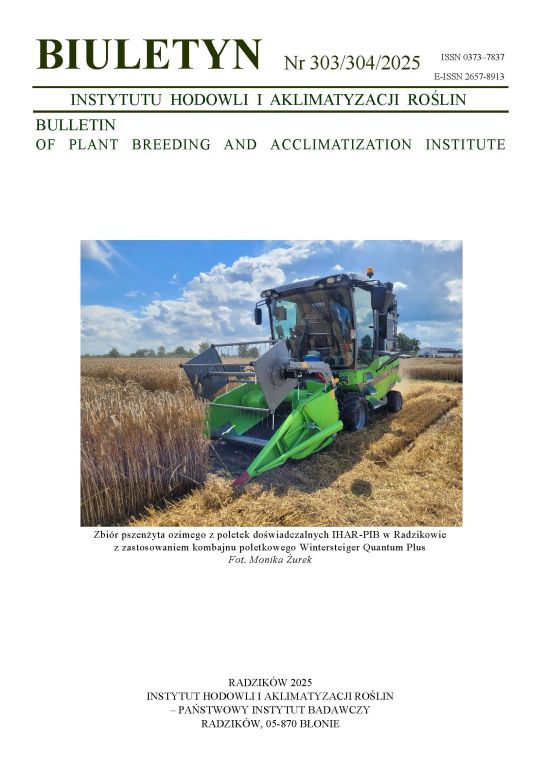Wskaźniki procesów życiowych zachodzących w sadzeniakach ziemniaka podczas długotrwałego przechowywania
Część II. Wpływ następczy warunków przechowywania sadzeniaków na wzrost i rozwój roślin potomnych
Genowefa Sowa-Niedziałkowska
g.niedziałkowska@ihar.edu.plZakład Przechowalnictwa i Przetwórstwa, Instytut Hodowli i Aklimatyzacji Roślin, Jadwisin (Poland)
Abstrakt
Na podstawie badań przeprowadzonych w latach 1986–2001 w Oddziale Naukowo-Badawczym IHAR w Jadwisinie określono wpływ warunków przechowywania sadzeniaków na wzrost i rozwój roślin potomnych. Badaniami objęto 54 odmiany ziemniaka, których sadzeniaki przechowywano wcześniej w temperaturze 2°, 6° i 10°C przy wilgotności względnej powietrza ponad 90%. Oceniano tempo wschodów roślin, obsadę roślin oraz liczbę pędów głównych w roślinie. Stwierdzono, iż temperatura przechowywania w sposób istotny wpływa na obsadę roślin. Wykazano istotną zależność między miejscami pustymi na poletku, liczbą pędów a optymalną temperaturą przechowywania sadzeniaków poszczególnych odmian. Miejsca puste na plantacji mogą być dobrym wskaźnikiem w określaniu wymagań termicznych odmian co do temperatury przechowywania sadzeniaków. Dotyczy to szczególnie odmian o krótkim okresie uśpienia i intensywnym wzroście kiełków.
Słowa kluczowe:
jakość fizjologiczna sadzeniaków, odmiana, rozwój roślin, temperatura przechowywania, wschody, ziemniakBibliografia
De Weerd J. W., Thornton R. E. 1990. Emergence of two potato cultivars as affected by low temperatures and physiological age. Abs. 11th Trien. Conf. of EAPR. Edinburgh; 402 — 403.
Google Scholar
Loon van C. D. 1987. Effect of physiological age on growth vigour of seed potatoes of two cultivars. 4. Influence of storage period and storage temperature on growth and yield in the field. Potato Res. 3: 441 — 450.
DOI: https://doi.org/10.1007/BF02361921
Google Scholar
Marinus J. 1992. The effect of temperature and light during storage of young seed potatoes on initial plant development at early plantings. Potato Res. Vol. 35: 343 — 354.
DOI: https://doi.org/10.1007/BF02357591
Google Scholar
Reust W., Winiger F. A., HebeisenT., Dutoit J. P. 2001. Assessment of the physiological vigour of new potato cultivars in Switzerland. Potato Res. 44: 11 — 17.
DOI: https://doi.org/10.1007/BF02360282
Google Scholar
Roztropowicz S. 1985. Wiek fizjologiczny bulw i jego znaczenie dla nasiennictwa ziemniaka. XVIII Sesja Nauk. Koszalin “Nasiennictwo ziemniaka”. Inst. Ziemn. Bonin: 101 — 103.
Google Scholar
Schuler K., Moll A. 1993. Etablierung von Kartoffelsorten im Feld nach physiologischer Alterung der Pflanzknollen. Potato Res. 36. 143 — 151.
DOI: https://doi.org/10.1007/BF02358729
Google Scholar
Sowa-Niedziałkowska G. 1993. Wpływ zróżnicowanej temperatury przechowywania sadzeniaków na wschody, liczbę pędów i plonowanie ziemniaka. Cz. II. Odmiany: Bliza, Bogna, Bzura, Ruta i Stobrawa. Biul. Inst. Ziemn. 42: 77 — 86.
Google Scholar
Sowa-Niedziałkowska G. 2000. Oddziaływanie zróżnicowanych warunków przechowywania sadzeniaków na rozwój i plonowanie nowych odmian ziemniaka. Biul. IHAR 213: 217 — 223.
Google Scholar
Sowa-Niedziałkowska G. 2002. Określenie optymalnej temperatury przechowywania sadzeniaków różnych odmian ziemniaka w skali 9-stopniowej. Biul. IHAR 223/224: 361 — 368.
Google Scholar
Sowa-Niedziałkowska G. 2004. Wskaźniki procesów życiowych zachodzących w sadzeniakach ziemniaka podczas długotrwałego przechowywania. Część I. Okres uśpienia i intensywność wzrostu kiełków. Biul. IHAR 233: 219 — 236.
Google Scholar
Struik P. C., Wiersema S. G. 1999. Control and manipulation of physiological seed tuber quality. In: Seed potato technology. Wageningen, The Netherlands: 97 — 131.
DOI: https://doi.org/10.3920/978-90-8686-759-2
Google Scholar
Zaag van der D. E., van Loon C. D. 1987. Effect of physiological age on growth vigour of seed potatoes on two cultivars. 5. Review of literature and integration of some experimental results. Potato Res. 30: 451 — 472.
DOI: https://doi.org/10.1007/BF02361922
Google Scholar
Autorzy
Genowefa Sowa-Niedziałkowskag.niedziałkowska@ihar.edu.pl
Zakład Przechowalnictwa i Przetwórstwa, Instytut Hodowli i Aklimatyzacji Roślin, Jadwisin Poland
Statystyki
Abstract views: 87PDF downloads: 34
Licencja
Prawa autorskie (c) 2004 Genowefa Sowa-Niedziałkowska

Utwór dostępny jest na licencji Creative Commons Uznanie autorstwa – Na tych samych warunkach 4.0 Miedzynarodowe.
Z chwilą przekazania artykułu, Autorzy udzielają Wydawcy niewyłącznej i nieodpłatnej licencji na korzystanie z artykułu przez czas nieokreślony na terytorium całego świata na następujących polach eksploatacji:
- Wytwarzanie i zwielokrotnianie określoną techniką egzemplarzy artykułu, w tym techniką drukarską oraz techniką cyfrową.
- Wprowadzanie do obrotu, użyczenie lub najem oryginału albo egzemplarzy artykułu.
- Publiczne wykonanie, wystawienie, wyświetlenie, odtworzenie oraz nadawanie i reemitowanie, a także publiczne udostępnianie artykułu w taki sposób, aby każdy mógł mieć do niego dostęp w miejscu i w czasie przez siebie wybranym.
- Włączenie artykułu w skład utworu zbiorowego.
- Wprowadzanie artykułu w postaci elektronicznej na platformy elektroniczne lub inne wprowadzanie artykułu w postaci elektronicznej do Internetu, lub innej sieci.
- Rozpowszechnianie artykułu w postaci elektronicznej w internecie lub innej sieci, w pracy zbiorowej jak również samodzielnie.
- Udostępnianie artykułu w wersji elektronicznej w taki sposób, by każdy mógł mieć do niego dostęp w miejscu i czasie przez siebie wybranym, w szczególności za pośrednictwem Internetu.
Autorzy poprzez przesłanie wniosku o publikację:
- Wyrażają zgodę na publikację artykułu w czasopiśmie,
- Wyrażają zgodę na nadanie publikacji DOI (Digital Object Identifier),
- Zobowiązują się do przestrzegania kodeksu etycznego wydawnictwa zgodnego z wytycznymi Komitetu do spraw Etyki Publikacyjnej COPE (ang. Committee on Publication Ethics), (http://ihar.edu.pl/biblioteka_i_wydawnictwa.php),
- Wyrażają zgodę na udostępniane artykułu w formie elektronicznej na mocy licencji CC BY-SA 4.0, w otwartym dostępie (open access),
- Wyrażają zgodę na wysyłanie metadanych artykułu do komercyjnych i niekomercyjnych baz danych indeksujących czasopisma.
Inne teksty tego samego autora
- Tadeusz Gruczek, Barbara Lutomirska, Genowefa Sowa-Niedziałkowska, Podatność odmian ziemniaka na uszkodzenia mechaniczne bulw i straty przechowalnicze , Biuletyn Instytutu Hodowli i Aklimatyzacji Roślin: Nr 232 (2004): Wydanie regularne
- Genowefa Sowa-Niedziałkowska, Wpływ odmiany ziemniaka i warunków przechowywania bulw na długość okresu uśpienia i intensywność kiełkowania , Biuletyn Instytutu Hodowli i Aklimatyzacji Roślin: Nr 232 (2004): Wydanie regularne
- Genowefa Sowa-Niedziałkowska, Określenie strat przechowalniczych nowych odmian ziemniaka , Biuletyn Instytutu Hodowli i Aklimatyzacji Roślin: Nr 232 (2004): Wydanie regularne
- Genowefa Sowa-Niedziałkowska, Wskaźniki procesów życiowych zachodzących w sadzeniakach ziemniaka podczas długotrwałego przechowywania , Biuletyn Instytutu Hodowli i Aklimatyzacji Roślin: Nr 233 (2004): Wydanie regularne
- Genowefa Sowa-Niedziałkowska, Określanie optymalnej temperatury przechowywania sadzeniaków różnych odmian ziemniaka w skali 9-stopniowej , Biuletyn Instytutu Hodowli i Aklimatyzacji Roślin: Nr 223/224 (2002): Wydanie regularne














